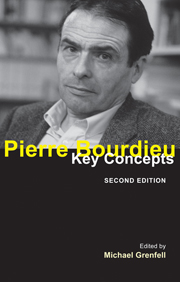Book contents
- Frontmatter
- Contents
- Contributors
- Acknowledgements
- Preface to the second edition
- Introduction
- PART I BIOGRAPHY, THEORY AND PRACTICE
- PART II FIELD THEORY – BEYOND SUBJECTIVITY AND OBJECTIVITY
- PART III FIELD MECHANISMS
- PART IV FIELD CONDITIONS
- PART V APPLICATIONS
- Conclusion
- Chronology of life and work
- Bibliography
- Index
Introduction
- Frontmatter
- Contents
- Contributors
- Acknowledgements
- Preface to the second edition
- Introduction
- PART I BIOGRAPHY, THEORY AND PRACTICE
- PART II FIELD THEORY – BEYOND SUBJECTIVITY AND OBJECTIVITY
- PART III FIELD MECHANISMS
- PART IV FIELD CONDITIONS
- PART V APPLICATIONS
- Conclusion
- Chronology of life and work
- Bibliography
- Index
Summary
Pierre Bourdieu is now regarded as one of the foremost social philosophers of the twentieth century. Born in a small village in the French Pyrenees, his extraordinary academic trajectory took him to the leading academic training schools of Paris. Eventually, he was nominated as “Chair” at the Collège de France, that most prestigious of institutions, which groups together fifty-two of the leading French academics, philosophers and scientists.
Bourdieu's output was voluminous. Beginning with ethnographies of the Béarn and Algeria, he went on to offer extensive studies of education, culture, art and language. For much of this time, Bourdieu was regarded as a sociologist, and he had a major influence in this academic field. However, his was a very particular type of sociology. His academic training was as a philosopher. It was only after personal experiences “in the field” in Algeria and the Béarn that he abandoned the traditional academic route of philosophy for sociology. This was in the 1950s, a time when sociology had not yet acquired its contemporary popularity or academic credibility. Certainly, his early works can be read as anthropologically orientated, a perspective he never really lost over the subsequent fifty years of his career.
During the 1960s and 1970s, Bourdieu seemed very much the private academic, sharing the Parisian intellectual world with other leading French writers such as Foucault, Derrida, Barthes, Lyotard, Althusser and Lacan.
- Type
- Chapter
- Information
- Pierre BourdieuKey Concepts, pp. 1 - 6Publisher: Acumen PublishingPrint publication year: 2012

